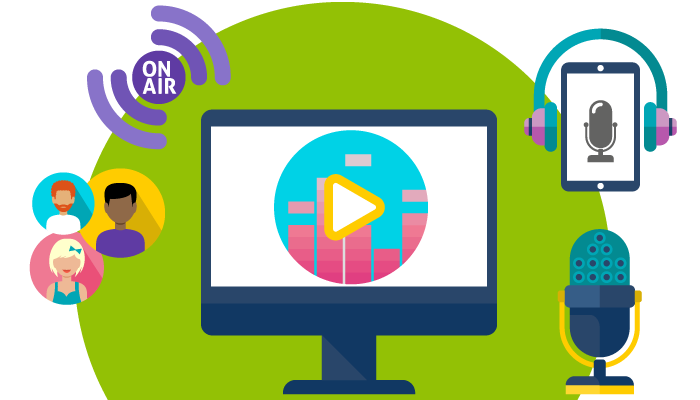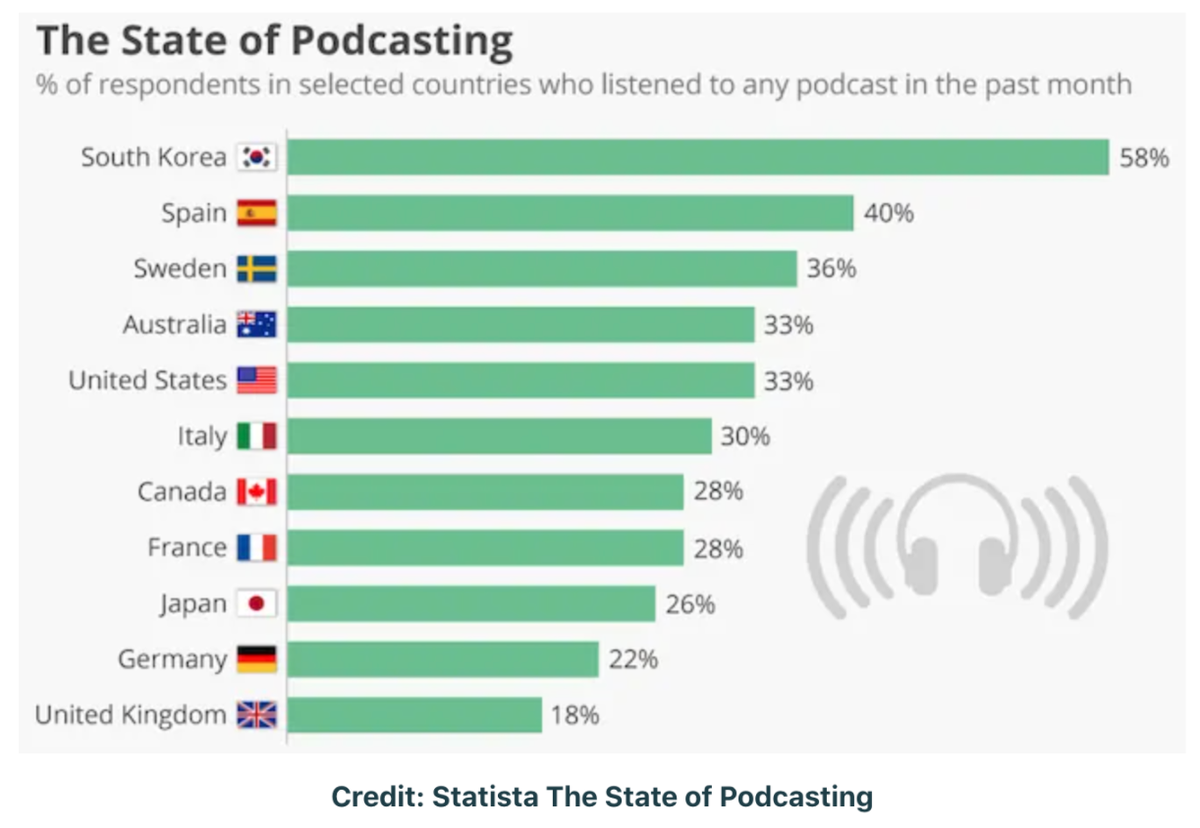Introduction

Podcasting continues to grow in popularity with audiences globally, currently 1,000,000 active shows and over 30 million episodes are being eagerly consumed. Podcast enthusiasts listen to over 5 podcasts a week, so if you have been thinking about starting your own podcast, but don’t really know where to begin, this factsheet gives you a step by step plan of how and why to begin a podcast that is engaging, sustainable and grows your business brand and connection to your customers.

Why start a podcast?
There are lots of great reasons to start a podcast, but for your business, the reason you do it should harmonise with your marketing and content strategy first and foremost. This means that you and your brand have a strong reason to communicate with your audience this way, and they in turn will be excited to engage with your product or service through a podcast. Strategically you would be looking to grow the value add your brand can bring and deepen the connection with your customers; to work with other influencers in your sector and connect with them; to grow your website traffic; and potentially set up affiliate products and sponsor relationships. Or you might be starting a podcast AS your business, which means you will apply the same type of business development and strategy for monetisation as you would any new business, and the how-to-doing is outlined below.
Tell a compelling story with interesting talent
The idea of doing a podcast may seem a little (or a lot!) daunting at first, but all new skills feel like that at the beginning, and as you do more on air time, you will find your voice and your style and your audience will grow with you. Critically as a podcast host you need to source talent and content that is relevant and interesting, and use it to tell a compelling story. Listen out for unusual angles and make sure that when you are interviewing people you have done your background research on them and are well prepared with interesting questions that they haven’t answered a million times before.
Making sure you have plenty of talent in the pipeline is important, and while you are out hunting for folk it can be helpful to create an email template you can use to reach out to new podcast guests. However, it can also be helpful to get on the person’s radar before you send a cold email. Even something simple, like sharing their content on social, commenting on their blogs, or even engaging over Facebook will help them put a face to a name. Create a list of people you want to interview, and reach out to everyone. Of course you’ll get a few ‘no’s’ along the way, but don’t let that put you off, be polite and persistent – the better your product is, the more people will want to be part of it, and you can always go back in a few months and ask again.
Play niche
When you start out you need a plan for your podcast episode arc, and it is best to get a few episodes under your belt so you have a suite of offerings for people to listen to when you launch. Make sure you are consistent in your production, you don’t want to leave your audience hanging! Assuming you already have a business offering or idea, your podcast should operate in that niche to build your thought leadership in that space. Basically, your niche is a small proportion of a smaller market you’ll focus your efforts on. So, instead of creating a general health and wellness podcast, you’d create a podcast that helps say entrepreneurs incorporate yoga into their daily lives or something that you can target specific interest groups in a unique and interesting way that is relevant to them.
If you are trying to narrow down your niche ask yourself what can you talk about till all hours with endless enthusiasm, what kind of problems would you love to solve for your audience, can you conceive of enough content for your niche area so your podcast can go on for years, and where are the growth areas in your sector that will want this type of content?
What’s in a name? (spoiler alert: LOTS!)
Your podcast name is incredibly important, it’s going to be with you for the long-term and plays an essential role in your brand. If you aren’t using your personal name or brand, make sure your podcast alludes to its content. Make sure you include a description that includes keywords to suggest what your show is actually about. Check to see that your chosen name isn’t being used by another show, and you aren’t infringing on anyone’s IP.
Websites and social
Once you’ve landed on a name make sure you register the domain name, so when your podcast becomes popular you’re not stuck battling for a domain later on. You can choose to have a dedicated website for your podcast, or you can add it in to your existing website and have links to the episodes and content including show notes. Make sure that you cross promote on your social media and create links to your talent and their sites and communities. The key part here is that the brand is harmonized with your existing business or personal brand. If you are setting up the podcast as your business then of course it will need to have its own marketing and social presence.
For your podcast to be successful it has to be social. You can’t expect your podcast to grow on its own without any help. Your podcast can in turn help you create tonnes of content marketing for your other channels, for example, you could turn an episode into a blog post, a guest blog to publish on another website, a series of social media updates, memes and shareable images. But social isn’t solo, so when you go live you can leverage your show by reaching out to guests and asking them to share the podcast episode with their audience. You can also engage your audience, and ask if they’ll leave an iTunes review of your podcast. You can also reach out to other podcasts you like about becoming a guest on their podcast with some collaborative flair.
Episode format options
Many podcasts have a similar episode format, with the biggest distinction being whether you’re going to be doing an interview-based show or not. While clearly the content of each will differ, you want to have a familiar pattern to how each show goes down. Think about ‘This American Life’ with its three act format which gives structure to the content. The listeners know what to expect and the tempo of the show takes it pace from the structure. You can also consider whether you will host solo or co-host, and if interviews are the main body of the show or used as a seasoning to your insights and information. Co-hosting can be with a series of interesting voices or regular guests. An example of a podcast format might be something like:
- Introduction to a voiceover or theme song
- Any announcements and recurring segments
- Guest interview
- Recap of main points and takeaways
- Outro and theme music
This doesn’t have to be set in stone, and you will undoubtedly evolve the format along the way based on input from listeners and the inclusion of advertising and sponsors as your market grows.
How long is a piece of podcast?
The length of each episode will depend upon the type of content you are producing. You have a wide range of podcast episode lengths to choose from, but most podcast episodes typically run from 20 to 45 minutes. The length should be intimately related to the quantity of compelling content you have available. Better to have 25 mins of killer than 40 mins of filler. How often you release isn’t as important as sticking to a consistent schedule. However, the more frequently you release the more material you’ll have to promote and the quicker you’ll gain traction with your podcast. Be mindful of the amount of effort involved and all the elements including scheduling and recording talent. What do you realistically have time for? It’s better to produce a higher-quality podcast less frequently, rather than rush through producing a podcast and have a poor quality offering.
Podcasting basics
Here are the key elements to getting your podcast out of your head and onto the airwaves.
Artwork: This is actually pretty important, as it is the first thing people will see when searching for you podcast. It like an album or book cover, so make sure it represents your brand and the content. As it will be in a podcast marketplace like iTunes, you also need to make sure it looks good and is clear when it is in a small render. You can do this on Canva, or get a designer to help you.
Scripting: You’ll want your podcast to feel conversational, not like you’re reading word-for-word from a script. But, instead of thinking of your script like a movie script, think of it like an outline. You won’t write out every single thing you’re going to say, but instead, create a rough outline of your talking points and interview questions if you have guests. If you’re a beginner having a script can help you feel less nervous and keep you from going off on tangents. New questions will arise throughout the interview, but having a list to choose from will help to ensure there’s no lull in the conversation.
Narrative arc: Plan out your podcast across a number of episodes with the key content you want to have, potential interviewees, and develop an ongoing ‘storyline’ that will let you link the episodes together and reference the overarching narrative. This will give you consistency and cohesion in the way you grow your series that should be obvious to your audience, especially if they are binge listening to a few episodes.
Space and Place: Once you are clear on your podcast purpose and content, its time to get technical. A quiet space where you can record is the first place to start, as while you can fix some things in post, the better option is to start smart. Find a room of the house that is away from traffic, dog and child noise, or a studio you can share with other podcasters.
Microphones: Audio quality is paramount in podcasting, but these days quality microphones are good value. You can start out with a USB mic that plugs into your computer port like a Audio Technica ART2100 and as you increase your investment move up to a stand alone mic like a Rode Procaster. Ask your guests to have a mic or headphones with a mic so they give you good clear sound from their end.
Recording your podcast: Recording your podcast is quite simple. All you have to do is plug in your microphone into your computer, open up your editing software, and press record.
Editing software: Your choices here, like with microphones will depend on budget and tech proficiency. One of the most commonly used audio software is Audacity. It’s free and has the tools to record, edit, and publish your podcast episodes. Zencastr is another favourite of podcasters with a freemium model to get you started. If you’re a Mac user, then GarageBand will be on your computer, but it has less editing features than Audacity. Paid options include Abode Audition, keeping in mind as a more advanced tool the learning curve will be a little steeper, but it will produce a very professional sounding podcast. If you’re interviewing and recording remote interviews via Skype, then you’ll want a recording software like Skype Auto Recorder. After the interview is recorded you can easily upload the file directly into your software for editing. You can use Zoom to record an interview and then pull the audio off that and import into your audio editing software. There are also cloud based services like Anchor that enable you to record, edit and distribute your podcast in one place.
Editing tips: In the edit, you want to make sure that the sound is good. Edit out any big gaps, ums and ahs where you can, remove any background noise and generally make it sound tight but natural. Always keep in mind that you can edit but you can’t add in something epic that you never captured, so make sure that all your tech works, and record everything possible while you have the talent live. The best podcasts aren’t the ones with the best production, they are the ones with the most compelling content. Get that right first and you are well on the way. Having imperfect production is authentic and expected, you will get better as you go, and your audience is pretty forgiving and most will come for the ride if their expectations are set and met.
Choosing music: Your podcast doesn’t have to utilize music, but if you listen to a lot of podcasts you’ll notice that a lot of them have snappy theme music throughout their intros. It does help to make your podcast sound a little more professional and to link segments together. To source music, you’ll be looking for stock music or royalty free music or some platforms like Anchor have stings and snippets you can use already built into the system. This will allow you to edit and place your own audio on top of the music, without running into any legal hassles. You can also get your creative buddies to make tunes for you but resist the urge to grab the latest Beyonce hit unless you want to deal with some major royalty payments.
Uploading: Time to go live! Now your podcast is finished you’re going to need a place to host your media files. There are multiple different avenues you can use to host your podcast. Some of the most common channels are Soundcloud, Libsyn, Podbean, and Podomatic, iTunes. You can then upload your podcast to a number of different podcast directories, which can help to improve the reach of your podcast like, Stitcher, and Blubrry, but the one place you really must be uploading your podcast is iTunes. Find out all the tips and tricks on how to do that here. Remember to be clever using keywords in your titles and descriptions to make sure you get found.
Keep at it!
Podcasting can be an incredible way to connect with your audience, expand your network, and grow your existing business. Creating a podcast audience is a long-term game. If it takes a while to get a larger audience, don’t give up. With podcasting, the results will come as long as you stick to a regular publishing schedule, promote each episode, and keep improving the quality of your podcast with better guests, improved material, and higher-quality production. Audiences take a while to build, but they will, you just have to keep with it. Like anything, you’ll get better in time, your show will improve, and you’ll start to attract new listeners and a growing band of fans.

